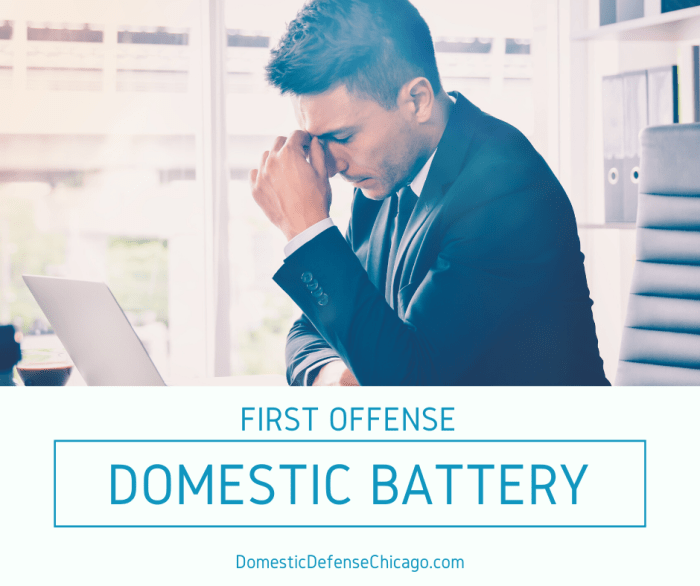Domestic battery 3rd degree arkansas – Domestic battery in the third degree, as defined by Arkansas law, is a serious offense that can have severe consequences. This article explores the legal definition of domestic battery in the third degree in Arkansas, the range of penalties that may be imposed, and the common defenses to this charge.
Additionally, resources for victims of domestic battery and prevention strategies will be discussed.
Definition of Domestic Battery 3rd Degree in Arkansas

Domestic battery in the third degree is a criminal offense defined under Arkansas Code Annotated § 5-26-303. It involves the intentional or knowing infliction of physical injury on a family or household member.
Actions Constituting Domestic Battery 3rd Degree
Actions that constitute domestic battery in the third degree include:
- Causing physical pain or injury, such as bruises, cuts, or broken bones
- Threatening to cause physical harm
- Recklessly causing bodily injury
Difference from Other Assault or Battery
Domestic battery in the third degree differs from other forms of assault or battery in that it specifically involves family or household members. Arkansas law defines family or household members as spouses, former spouses, parents, children, siblings, grandparents, grandchildren, and people who have a child in common.
Penalties for Domestic Battery 3rd Degree in Arkansas

Domestic battery in the third degree is a Class D felony in Arkansas. The range of penalties for this offense includes:
- Up to six years in prison
- A fine of up to $10,000
- A combination of jail time and fines
The severity of the penalties imposed will depend on several factors, including:
- The defendant’s prior criminal record
- The presence of aggravating circumstances, such as causing serious bodily injury to the victim
- The defendant’s relationship to the victim
A conviction for domestic battery in the third degree can have several consequences, including:
- Jail time
- Fines
- Loss of rights, such as the right to possess a firearm
Defenses to Domestic Battery 3rd Degree in Arkansas: Domestic Battery 3rd Degree Arkansas

Defenses to domestic battery in the third degree in Arkansas aim to demonstrate that the accused did not commit the alleged act or that there was justification or excuse for the conduct. Common defenses include:
Self-Defense or Defense of Others:The accused reasonably believed that they or another person was in imminent danger of being harmed and used force to protect themselves or others.
Lack of Intent:The accused did not intend to cause physical harm to the victim and their actions were accidental or unintentional.
Mistake of Fact:The accused reasonably believed that their conduct was not criminal, such as mistaking the victim’s consent or acting under the influence of a mental illness.
Provocation:The victim’s conduct provoked the accused to act in self-defense or in a manner that was not excessive.
Consent:The victim consented to the physical contact, negating the element of force required for domestic battery.
Burden of Proof
In Arkansas, the prosecution bears the burden of proving beyond a reasonable doubt that the accused committed domestic battery in the third degree. The defenses presented by the accused aim to raise doubt or provide an alternative explanation for the alleged conduct, shifting the burden of proof to the prosecution to rebut the defenses.
Challenges
Defending against a domestic battery charge can be challenging due to the emotional nature of the allegations and the potential for bias or prejudice. However, by presenting a strong defense based on relevant legal arguments and evidence, the accused can challenge the prosecution’s case and potentially avoid conviction.
Resources for Victims of Domestic Battery in Arkansas

Victims of domestic battery in Arkansas have access to various resources and organizations that provide support and assistance. These resources offer a range of services, including crisis hotlines, legal aid, and counseling, to help victims cope with the trauma and aftermath of domestic violence.
Seeking help is crucial for victims of domestic battery. These resources can provide victims with the necessary support, guidance, and protection to escape abusive situations and rebuild their lives.
Crisis Hotlines
- Arkansas Domestic Violence Hotline: 1-800-799-SAFE (7233)
- National Domestic Violence Hotline: 1-800-799-SAFE (7233)
Legal Aid
- Arkansas Legal Aid: 1-800-950-5844
- Legal Aid of Arkansas: 1-800-950-5844
Counseling
- Arkansas Coalition Against Domestic Violence: 1-800-799-SAFE (7233)
- Domestic Violence Intervention Program: 1-800-799-SAFE (7233)
Prevention of Domestic Battery in Arkansas

Domestic battery is a serious problem in Arkansas, with one in four women and one in seven men experiencing domestic violence in their lifetime. Prevention is key to reducing the incidence of domestic battery, and there are a number of things that can be done to help prevent it.
One important step is to identify the risk factors and warning signs of domestic battery. These include:
- A history of domestic violence in the family
- A pattern of controlling behavior by one partner
- Threats of violence
li>Physical or emotional abuse
If you are concerned that someone you know is at risk for domestic battery, it is important to reach out to them and offer your support. You can also contact a domestic violence hotline or service for more information and resources.
Community education and awareness programs are another important part of preventing domestic violence. These programs can help to raise awareness of the issue, challenge harmful attitudes and beliefs, and promote healthy relationships.
Role of Bystander Intervention, Domestic battery 3rd degree arkansas
Bystander intervention is an important way to prevent domestic battery. If you see or hear something that makes you think someone is being abused, it is important to do something. You can:
- Call the police
- Contact a domestic violence hotline or service
- Talk to the person you are concerned about
- Offer to help them get out of the situation
Reporting suspected cases of domestic battery is also important. You can report it to the police, a domestic violence hotline or service, or to the Arkansas Department of Human Services.
Query Resolution
What is the definition of domestic battery in the third degree in Arkansas?
Domestic battery in the third degree occurs when a person knowingly or recklessly causes bodily injury to a family or household member.
What are the penalties for domestic battery in the third degree in Arkansas?
Penalties range from a fine of up to $1,000 and/or imprisonment for up to one year.
What are some common defenses to domestic battery in the third degree in Arkansas?
Common defenses include self-defense, defense of others, and lack of intent.
